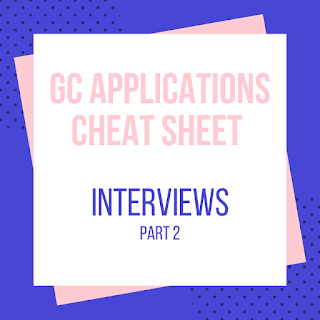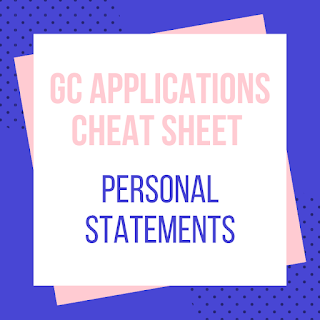GC Applications Cheat Sheet: Interviews (Part 2)
First of all, I want to take a moment to thank you all so much for all the love, support, and sharing of the Interviews (Part 1) blog post! I've gotten so many kind words since posting it, and am so thrilled to hear that the words of wisdom that were shared with me resonated with so many of you.
But, let's not waste too much time and move on to Interviews (Part 2).
So, I realize that this post is going up pretty late, some of that has to do with the fact that my chosen interview dates are at the end of the interview season. But it also has a lot to do with the fact that I have been extremely busy for all of February and the first half of March, and haven't had the time to prepare for my interviews until now. But now that I have had a moment to catch my breath, I wanted to share with you all how I have been preparing for my interviews.
Unlike Part 1 (if you haven't read that post, please go check it out!), this post will focus on the actions that I have taken to prepare for my interviews, rather than advice on how to approach them. So, let's just get into it!
The most important thing I've been doing in my interview prep is taking time for myself to reflect on my journey. I have some introverted tendencies, and interview days can take a lot out of me, so it's been a huge part of my preparation to take time to be with myself. In quiet moments I am able to reflect on everything I've learned in the past year and a half, and just take time to recharge my batteries. In the midst of all the craziness of interviews, it is really important to practice moments of self-care, and for me that is taking time to practice mindfulness and meditate on my experiences.
Hopefully some of you found these helpful for you in your preparation for interviews! Just remember that if you are preparing for an interview, you are already qualified on paper! The interview is just an opportunity for the program to get to know who you are as a person, and a chance for you to see if the program is a good fit for you. Just be yourself, and let your passion shine through!
But, let's not waste too much time and move on to Interviews (Part 2).
So, I realize that this post is going up pretty late, some of that has to do with the fact that my chosen interview dates are at the end of the interview season. But it also has a lot to do with the fact that I have been extremely busy for all of February and the first half of March, and haven't had the time to prepare for my interviews until now. But now that I have had a moment to catch my breath, I wanted to share with you all how I have been preparing for my interviews.
Unlike Part 1 (if you haven't read that post, please go check it out!), this post will focus on the actions that I have taken to prepare for my interviews, rather than advice on how to approach them. So, let's just get into it!
1. Review My Notes
You all might recall that I have kept a pretty detailed journal of all of my relevant experiences over the past year and a half. So, a big part of my preparation for interviews is simply re-reading and reviewing all of the notes that I've taken in that time! I've been reviewing my notes on all of the genetic counseling sessions I've shadowed, reflections on conversations I've had with genetic counselors, other students, and even crisis counseling experiences. This is just a great way for me to refresh my memory about how I felt in those moments, and to recall specific details that I may have forgotten over time. By reviewing these, and recalling some of those little details, I can create a more well-rounded story when I share these experiences with my interviewers. Additionally, this has been a really great way for me to reflect on how much I've accomplished in the past year and a half, which has been really reassuring amidst all of the stress of interviews.
2. Write New Notes
In my last post about interview prep, I featured a ton of great advice and wisdom from previous applicants, current students, and current genetic counselors. A lot of my conversations with those people gave me a great idea about what kind of questions I might be asked, or areas of my experience that I should reflect a little more on. So, another part of my preparation has been to reflect on their advice and on some of the questions I might be asked in my journal. My biggest advice for anyone who might want to try this is to do your best not to self-edit. I know that I really struggle with letting my thoughts flow freely, and more importantly, imperfectly, and that often puts me in a place where I feel stuck. So when I was reflecting on questions or experiences, I did my best to allow myself to be messy and to have imperfect or incoherent thoughts. Then, I would leave and come back to those reflections and refine them. In having first, second, and third drafts of my thoughts, I am preparing myself to share my "final draft" with my interviewers. This, I find, is really helpful in helping me to slow down in an interview. I often find that my mind is racing at 100 mph, and my mouth can barely keep up with all of the thoughts going on in my head, and taking time beforehand to kind of practice those responses and organize my thoughts is really helpful.
3. Mock Interview
If you're like me, it's been a while since you've been in such a formal interview setting. The whole process of dressing up and presenting yourself in a formal interview feels very unnatural at this point in my life. I knew that it was important for me to practice and allow myself to remember how it feels to be in such a formal setting. This is why I set up a mock interview! Mock interviews are a great way of tackling day-of nerves because it gives your body and mind a chance to practice interviewing in a space where it is safe to fail, and more importantly give you time to reflect and work on anything that might need a little more attention. In doing my mock interview, I was able to really identify some of the nervous ticks I have, like avoiding eye contact or fidgeting with my jewelry. Some of these things can be really distracting when in an interview, and being able to identify those ticks is the best way to try to stop yourself from doing them.
I was able to set up a mock interview with my undergraduate university's career center. Fortunately, I don't live too far from their offices, so I was able to physically go in and conduct a mock interview but, I know this might not be the case for everyone. My university's career center has a video-conferencing mock interview system set-up for individuals who might not be able to come in for a mock interview. This particular system is great because it allows you to customize the interview questions (given to you by a bot) and it films your responses so that you can watch yourself. If your university doesn't have a mock interview system set-up, you can also conduct a mock interview for yourself! I like this article published in The Muse about how to mock interview yourself, but essentially all you need is a camera and a few questions to ask yourself. Film your responses as if you are answering them in the interview, and review the footage to not only hear how you respond, but to observe your physicality as well!
4. Research
If you're program provides you with an itinerary of who you will be interviewing with, it might be a good idea to do a little research into the people who will be interviewing you. Having an idea about the program or interviewer, and being able to discuss what you learned about them, shows that you care and are committed to the program. It also gives you an opportunity to drop buzz words to show that you align with the culture of the program, or things that you might have in common with your interviewers. Or, maybe you're interested in some of their research or the work that they've done in the field, mentioning that in an interview can suggest that maybe you're a good fit for their program because your research interests align with faculty research.
5. Reflection and Meditation
The most important thing I've been doing in my interview prep is taking time for myself to reflect on my journey. I have some introverted tendencies, and interview days can take a lot out of me, so it's been a huge part of my preparation to take time to be with myself. In quiet moments I am able to reflect on everything I've learned in the past year and a half, and just take time to recharge my batteries. In the midst of all the craziness of interviews, it is really important to practice moments of self-care, and for me that is taking time to practice mindfulness and meditate on my experiences.
Hopefully some of you found these helpful for you in your preparation for interviews! Just remember that if you are preparing for an interview, you are already qualified on paper! The interview is just an opportunity for the program to get to know who you are as a person, and a chance for you to see if the program is a good fit for you. Just be yourself, and let your passion shine through!




Anxiety depression counsellinganxiety counselling Edmonton. Certified counselor provides. Do you have an anxiety or phobia? contact us for anxiety counselling. Learn about anxiety
ReplyDeleteHi Dear,
ReplyDeleteThanks for sharing such useful blog. Really! This Blog is very informative for us which contain lot of information about counselling service. I like this post. Please visit at "Best counselling Edmonton " , i hope you may like our counselling.
Visit Here - https://edmontoncounsellingservices.ca/services/family-counseling/
Thanks Regards,,